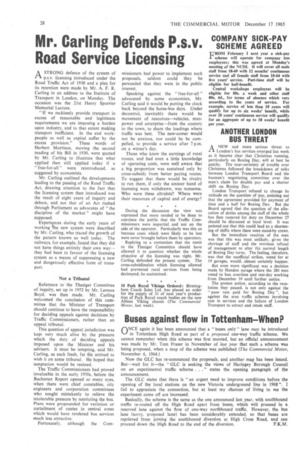Mr. Carling Defends P.s.v.
Page 30

If you've noticed an error in this article please click here to report it so we can fix it.
Road Service Licensing
A STRONG defence of the system of
p.s.v. licensing introduced under the Road Traffic Act of 1930 and a plea for its retention were made by Mr. A. F. R. Carling in an address to the Institute of Transport in London, on Monday. The occasion was the 21st Henry Spurrier Memorial Lecture.
"If we recklessly provide transport in excess of reasonable and legitimate requirements we are imposing a burden upon industry, and to that extent making transport inefficient. In the end workpeople as well as capital suffer by the excess provision." These words of Herbert Morrison, moving the second reading of his Bill in 1930, were quoted by Mr. Carling to illustrate that what applied then still applied today if a " free-for-all" were reintroduced, as suggested by economists.
Mr. Caning outlined the developments leading to the passing of the Road Traffic Act, drawing attention to the fact that the licensing system then introduced was the result of eight years of inquiry and debate, and not that of an Act rushed through Parliament as advocates of "the discipline of the market might have supposed.
Experiences during the early years of working ihe new system were described by Mr. Carling, who traced the growth of the pattern known so well today. The railways, for example, found that they did not have things entirely their own way-they had been in favour of the licensing system as a means of suppressing a new and dangerously effective form of transport.
Not a Tribunal
Reference to the Thesiger Committee of inquiry, set up in 1952 by Mr. Lennox Boyd. was then made. Mr. Carling welcomed the conclusion of this committee that the Minister of Transport should continue to have the responsibility for deciding appeals against decisions by Traffic Commissioners, rather than an appeal tribunal.
This question of appeal jurisdiction was kept very much alive by the pressure which the duty of deciding appeals imposed upon the Minister and his advisers. It must be tempting, said Mr. Carling, as each fresh, fat file arrived to wish it on some tribunal. He hoped that temptation would be resisted.
The Traffic Commissioners had proved invaluable in the early 1950s, before the Buchanan Report opened so many eyes, when there were chief constables, city engineers and corporation committees who sought mistakenly to relieve the intolerable pressure by restricting the bus. Plans were propounded for variation or curtailment of routes in central areas which would have rendered bus services much less attractive.
Fortunately. although the Corn
missioners had power to implement such proposals, seldom could they be persuaded that they were in the public interest.
Speaking against the " free-for-all " advocated by some economists, Mr. Carling said it would be putting the clock back beyond the horse-bus days. Under decontrol, inevitably there would be movement of resources—vehicles, manpower and enterprise—from the country to the town, to share the loadings where traffic was best. The new-comer would not be anxious, nor could he be compelled, to provide a service after 7 p.m. on a winter's day.
Those who knew the earnings of rural routes, and had even a little knowledge of operating costs, were well aware that a big proportion was sustained only by cross-subsidy from better paying routes. To suggest that there would be rivalry to run them, if only the sinister hand of licensing were withdrawn, was nonsense. Who were these altruists? Where were their resources of capital and of energy?
During the discussion the view was expressed that more needed to be done to convince the public that the Traffic Commissioners were impartial and not on the side of the operator. Particularly was this so because cases which were likely to be lost were never brought before them by operators.
• Replying to a contention that the remit to the Thesiger Committee should have allowed it to question whether the whole objective of the licensing was right, Mr. Carling defended the present system. The cross-subsidization which licensing allowed had prevented rural services from being decimated, he maintained.
10 Park Royal Vikings Ordered: Birmingham Coach Sales Ltd. has placed an order for the supply of 10 of next year's production of Park Royal coach bodies on the new Albion Viking chassis (The Commercial Motor, last week).












































































































